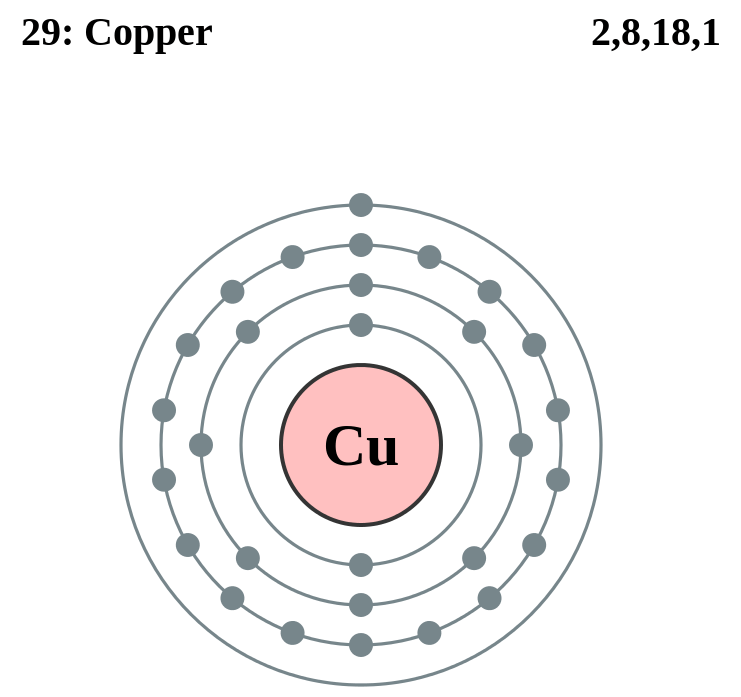Difference Between Cuprous and Cupric
Key Difference – Cuprous vs Cupric
The stable cations formed by copper, which is a d block element, are cuprous cation and cupric cation. The cuprous and cupric ions are different from each other based on their electronic configurations. The key difference between cuprous and cupric is that cuprous is copper 1+ cation whereas cupric is copper +2 cation.
CONTENTS
1. Overview and Key Difference
2. What is Cuprous
3. What is Cupric
4. Similarities Between Cuprous and Cupric
5. Side by Side Comparison – Cuprous vs Cupric in Tabular Form
6. Summary
What is Cuprous?
The name cuprous is given to the +1 cation formed by the copper atom. It is denoted by Cu+1. The electron configuration of copper atom is [Ar] 3d10 4s1. When the cuprous cation is formed, the electron configuration is [Ar] 3d10 4s0. Therefore, the cuprous cation is formed when one electron is removed from the copper atom. Since the cuprous cation can bind with only one other anion with -1 oxidation state, the cuprous cation is known as a monovalent cation. The electron configuration of cuprous cation is very stable. Thus there are, many compounds formed by this cation. Some examples are shown below:
The hydration energy of a molecule or ion is the amount of energy released when one mole of that compound u8ndergo hydration (dissolution in water).

Figure 01: The Atomic Structure of Copper
The cuprous ion has low hydration energy compared to the cupric ion because the d10 electron configuration in a cuprous ion is stable than the d9 electron configuration in cupric ion.
What is Cupric?
The name cupric is given to the +2 cation formed by the copper atom. It is denoted by Cu2+. The electron configuration of copper atom is [Ar] 3d10 4s1. When the cupric cation is formed, the electron configuration is [Ar] 3d9 4s0. The cupric cation is formed when two electrons are removed from a copper atom, giving the atom a 2+ electrical charge. The cupric cation can bind with either two anions having -1 oxidation state or one anion having -2 oxidation state. Therefore, the cupric cation is a divalent cation. The compounds formed with this cation include followings:
What are the Similarities Between Cuprous and Cupric?
- Both Cuprous and Cupric are cations formed from the loss of electrons from a copper atom.
- Both are stable cations.
- Both have a positive electrical charge.
- Both have the same atomic mass (because the mass of an electron is negligible).
What is the Difference Between Cuprous and Cupric?
Cuprous vs Cupric | |
| The name cuprous is given to the +1 cation formed by the copper atom. | The name cupric is given to the +2 cation formed by the copper atom. |
| Category | |
| Cuprous ions are monovalent cations. | Cupric ions are divalent cations. |
| Electron Configuration | |
| The electron configuration of cuprous ion is [Ar] 3d10 4s0. | The electron configuration of cupric ion is [Ar] 3d9 4s0. |
| Electron Lost to form a Copper Atom | |
| Cuprous ion is formed when one electron is lost from the copper atom. | Cupric ion is formed when two electrons are lost from the copper atom. |
| Stability | |
| The stability of cuprous ion is high due to the d10 electron configuration. | The stability of cupric ion is low due to the d9 electron configuration. |
| Denotation | |
| The cuprous ion is denoted by Cu+1. | The cupric ion is denoted by Cu2+. |
| Electrical Charge | |
| The cuprous ion has +1 electrical charge. | The cupric ion has +2 electrical charge. |
| Hydration Energy | |
| The hydration energy of the cuprous ion is low compared to the cupric ion. | The hydration energy of the cupric ion is high when compared to the cuprous ion. |
Summary – Cuprous vs Cupric
Cuprous ion and cupric ion are cations formed from copper atom due to loss of electrons. The difference between cuprous and cupric is that cuprous is copper 1+ cation whereas cupric is copper +2 cation.
Reference:
1. “Copper.” Wikipedia, Wikimedia Foundation, 3 Apr. 2018. Available here
2. “Cupric Cation.” National Center for Biotechnology Information. PubChem Compound Database, U.S. National Library of Medicine. Available here
Image Courtesy:
1.’Electron shell 029 Copper’ (CC BY-SA 2.0 uk) via Commons Wikimedia
ncG1vNJzZmivp6x7pbXFn5yrnZ6YsqOx07CcnqZemLyue8OinZ%2Bdopq7pLGMm5ytr5Wau26v1KmpqK2jYq6vsIyvqmabpaW%2Fqq%2BO